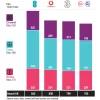International Internet Capacity Growth Falls as Bandwidth Climbs to 77Tbps
TeleGeography’s latest research reveals that global Internet capacity growth has fallen to its lowest pace in five years (down from 68% in 2008 to 40% in 2012), yet actual Internet bandwidth has more than doubled between 2010 and 2012 and now stands at 77Tbps (Terabits per second).
The slower growth of internet capacity and traffic is believed to be a combination of factors, including slowing broadband ISP subscriber growth in mature markets (e.g. Europe and the USA), the rising adoption of Content Delivery Networks (CDNs) and greater use of local caching technologies. The last one helps to take the load and some of the cost away from an ISPs network by caching the most frequently accessed content (e.g. video streams) as close to their customers as possible.
Advertisement

Alan Mauldin, TeleGeography Research Director, said:
“With the exception of a few developing countries, the days of triple-digit annual growth rates are long past. However, even with the use of CDNs and caching technologies, the compounding effect of rapid traffic growth will continue to require carriers to make considerable investments to expand network capacity.”
Meanwhile internet bandwidth is continuing to be driven by rising broadband penetration in developing markets, which supports subscriber growth, greater adoption of bandwidth-intensive applications (e.g. online video and IPTV services) and faster service speeds.
Mark is a professional technology writer, IT consultant and computer engineer from Dorset (England), he also founded ISPreview in 1999 and enjoys analysing the latest telecoms and broadband developments. Find me on X (Twitter), Mastodon, Facebook, BlueSky, Threads.net and Linkedin.
« BT Extend UK ISP Proactive Cable Theft and Damage Report Trial Nationwide


















































Comments are closed